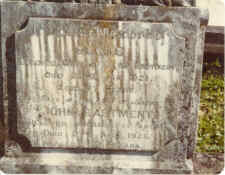
In Loving Memory of
SLOME
beloved wife of John Eastment
died 27th January 1921
aged 77 years
"Safe in the arms of Jesus"
JOHN EASTMENT
Beloved husband of above
died 2nd August, 1826
aged 87 years
In God's care
(East Lismore Cemetery)

In Loving Memory of
SLOME
beloved wife of John Eastment
died 27th January 1921
aged 77 years
"Safe in the arms of Jesus"
JOHN EASTMENT
Beloved husband of above
died 2nd August, 1826
aged 87 years
In God's care
(East Lismore Cemetery)
On the 23rd October, 1920, John Eastment made his last Will and testament. In that will he is described as a Farmer of Wyrallah near Lismore. Two of his sons-in-law were appointed as executors - Edward Moehead (married to Florence) and Rupert Reginald Read (married to Maud). The will gave all of his property to his surviving children - Edward James, John William, Charles Richard, Henry Thomas, Alfred Ernest, Mary Jane, Florence Emily, Alice Salome and Maud Cedelia (the oldest child, Ann Elizabeth, had died in 1902). It is specifically provided in the Will that the share of his estate belonging to each of his daughters is for that daughter's "sole and separate use and benefit independing of and free from the debts, engagements intereference or control of any husband". The will makes no provision for John's wife, Salome, who was still alive at the time of its making. However, she died only three months after the will was made.
On the 8th February, 1926, only six months before his death, John signed a codicil to his will which removed Rupert Read as executor and instead appointed a family friend, Sidney Tucker Selwood as executor. Edward Moehead remained as executor.
Probate of John's will was granted on 29 September, 1926 to Edward Moehead and Sidney Tucker Selwood and the estate was valued at 5192.1.1
According to family story (again related by Elsie Taylor), there was a great upset within the family over John's will, as he didn't leave anything to his daughters, but instead left everything equally divided amongst his sons. (This is obviously incorrect, considering the terms of the Will as probated). Henry Thomas purchased the farm at Wyrallah from his brothers. The other sons suspected there was more acreage there than had been paid for. Henry Thomas (who was a keen businessman and fairly unscrupulous) made the offer that if the brothers paid for a surveyor and there proved to be more land than had been paid for, Henry would pay the extra money for the extra land without a problem. However, if he (Henry) had to pay for the surveyor, then he would not pay anything extra no matter what the surveyor found. The brothers would not pay for the survey and accordingly Henry did. It was found that were was an extra 27 more acres than he'd paid for, and of course, the brothers tried to make him pay for the land, despite what had been said. Henry refused, and his brothers took him to Court, lost, and eventually took it to the High Court.
However, I don't know how much of this story is true and I am currently working to try and verify it.
So far I have found that Henry Thomas did indeed purchase John's farm at Wyrallah. This purchase did not take place until 25 November, 1931, five years after John's death and the grant of Probate of the Will, which gives some support to the story of the family dispute. Henry Thomas paid 2329 pounds for the land - the same acreage as was originally purchased by John in 1866.
Henry Thomas apparently had no intention of keeping
or farming the land (he lived in Queensland at that time) and by February,
1933, the farm had been split into two portions and sold out of the family.
|
|
|
|
|
|
|
|
|
|
|
|